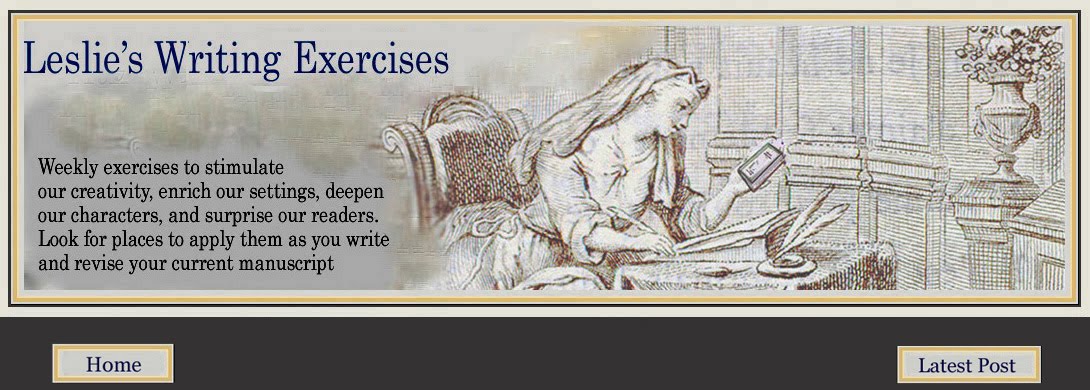Here's a fun one. I love to apply this exercise to a slow passage in my fiction, one that's necessary to the plot, of course, but one that lacks texture or is a bit too predictable. It works especially well for quiet moments, love scenes, and scenes with lots of dialogue.
In fiction, surprises are not limited to plot twists, revelations, and tricky surprise endings. In The Joy of Writing Sex -- A Guide for Fiction Writers (an absolute must-read if your story is going to include a sex scene) author Elizabeth Benedict says that, "Good writing offers all kinds of surprises and pleasures--of scene, plot, character, and language--and good writing about sex does, too."
In fiction, surprises are not limited to plot twists, revelations, and tricky surprise endings. In The Joy of Writing Sex -- A Guide for Fiction Writers (an absolute must-read if your story is going to include a sex scene) author Elizabeth Benedict says that, "Good writing offers all kinds of surprises and pleasures--of scene, plot, character, and language--and good writing about sex does, too."
Benedict lists five categories of "ordinary surprises good writers spring on us, often so subtly we aren't aware of it, in order to give depth and texture to their sex scenes…" These include surprises of action, speech, distraction, insight, and language. Surprises like these are essential to all good writing and we should consider including them to improve not only our sex scenes but every other type of scene as well. Booker Prize-winning author, Peter Carey, in reviewing The Joy of Writing Sex wrote: "Read it because it will teach you everything you need to know about writing good fiction, whether your characters are having sex or having breakfast." I agree one-hundred percent!
Below is brief description of each of those categories of surprise, but you should read The Joy of Writing Sex to get the whole scoop--including excerpts and advice from some of today's most celebrated authors--and in particular, how surprises like these can add depth and texture to a sex or love scene.
l Surprise of Action: in which something unexpected happens. An action doesn't need to be huge or dramatic to be surprising. It can be something as monumental as a stranger storming into the room brandishing an automatic weapon, or an action as subtle as an ill-timed cough.
l Surprise of Speech: in which characters speak during the scene, and what they say is surprising or unexpected. "As with all good dialogue, dialogue in [a sex scene] should be there for a reason integral to the characters and the story. We should learn something about the characters or their circumstances from what they say to each other in bed." [Elizabeth Benedict]
l Surprise of Distraction: in which a character is distracted by another character, or by a sound, a smell, a memory, a poison oak rash--anything that takes the character's attention away from what he is supposed to be concentrating on in the scene.
l Surprise of Insight: the character realizes something she didn't before. Perhaps she intuits the true nature of the situation. Something clicks in her brain and suddenly the pieces of a puzzle fall into place. Perhaps she makes an observation and her thoughts interrupt the action in the scene.
l Surprise of Language: in which the writer surprises the reader with "original language and metaphor that demand our attention, words that are particularly eloquent at doing what our words are meant to do: move the reader to feel what the character feels at that moment, whether it is arousal, excitement, melancholy, fear, or revulsion." [Elizabeth Benedict]
These are only a handful of the many kinds of surprises writers use when creating memorable moments in their fiction. As Benedict says, you will certainly encounter others in your own reading and writing.
The exercise this week is based on something Benedict refers to in her book as a "Surprise Platter," a scene that contains several different surprises in one scene. To illustrate this, she gives us a scene from Philip Roth's Portnoy's Complaint in which the teenage protagonist, determined to lose his virginity, visits a prostitute along with a group of his friends--a scene in which almost every line "serves up something unexpected, and the stakes keep rising higher and higher." [Roth's passage is found on p. 68 of Benedict's book]
This is an exercise I came up with based on Elizabeth Benedict's five categories of surprise:
Elizabeth Benedict: The Joy of Writing Sex, A Guide for Fiction Writers Click here to listen to an interview with Elizabeth Benedict on ABC Radio Australia, talking about sex in literature.



No comments:
Post a Comment
Thanks for sharing your thoughts...